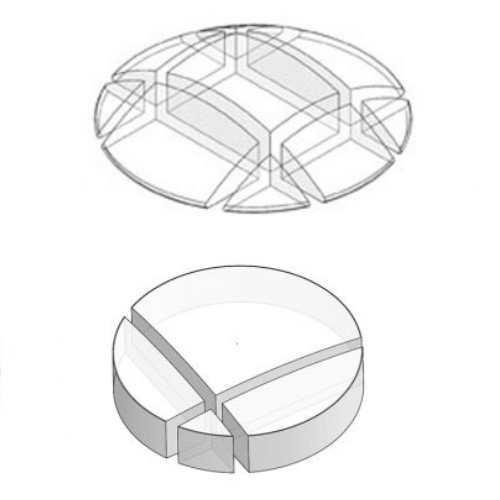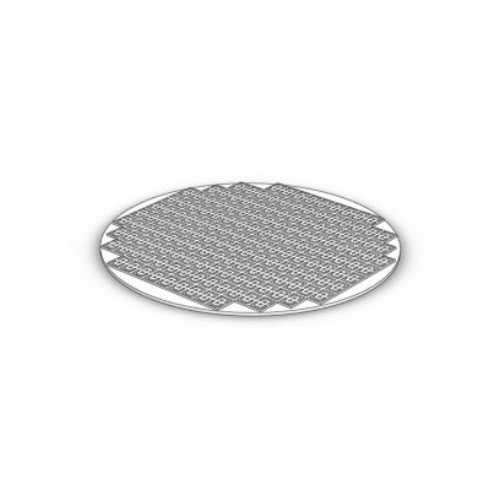Dicing Applications
Silicon wafers
Applications
Wafer dicing to singulate die such as computer processors, chips, other etched devices
Process targets
Process and blade optimisation to ensure the highest productivity and lowest cost without sacrificing cut quality, continuous improvement of work holding materials and chucks to minimise top and bottom surface chipping, protection of special coatings or fine MEMS structures, maintaining accurate cutting tolerances to keep within the streets.
Options
There are two options for you to pursue wafer dicing. Firstly, Loadpoint manufacture a number of machine systems so you can perform the work at your premises. Secondly, Loadpoint offers a dicing solutions and processing service whereby you send us your material and specifications and we will dice and return the work for you.
Systems:
- MicroAce 66: 6” / 160mm dia. x 13mm work area, 2”, 3” and 4” blade capacity
- NanoAce 3200: 8” / up to 250mm dia. x 13mm work area, 2”, 3” and 4” blade capacity
- NanoAce 3300: 12” / 300mm dia. x 13mm work area, 2”, 3” and 4” blade capacity
- MacroAce II: 420mm x 305mm x 100mm work area (non-rotational), 4” to 8” blade capacity
- Post-dice cleaning: Washpoint 300
- Preparation of tape/grip rings: Presspoint
Loadpoint dicing solutions
Loadpoint dicing solutions facility for dicing, cutting, drilling, grinding and prototyping.

Photonics, optics and glass
Applications
Photonics – dicing to singulate optical components such as LEDs, photodiodes and photosensors
Optics – Optic fibre and associated component cutting, optical lenses and windows
Glass – cutting of encoders, glass scales, chrome masks
Process targets
Dicing: Process and blade optimisation to ensure the highest productivity and lowest cost without sacrificing cut quality, optimisation of work holding materials & chucks to minimise top and bottom surface chipping, protection of special optical coatings & masks whilst dicing, verticality of cuts, maintaining precision for angled cuts.
Post-dice cleaning & handling: Ensuring the materials are free of contamination from dicing tapes & wax, developing the best cleaning process to maximise productivity and cleanliness, protecting the materials whilst cleaning, developing systems and packaging to guarantee protection during the next work process or off-site transportation.
Options
There are two options for you to pursue photonics, optics and glass dicing. Firstly, Loadpoint manufacture a number of machine systems so you can perform the work at your premises. Secondly, Loadpoint offer a dicing solutions whereby you send us your material and specifications and we will dice and return the work for you.
Systems:
- MicroAce 66: 6” / 160mm dia. x 13mm work area, 2”, 3” and 4” blade capacity
- NanoAce 3200: 8” / up to 250mm dia. x 13mm work area, 2”, 3” and 4” blade capacity
- NanoAce 3300: 12” / 300mm dia. x 13mm work area, 2”, 3” and 4” blade capacity
- MacroAce II: 420mm x 305mm x 100mm work area (non-rotational), 4” to 8” blade capacity
- Post-dice cleaning: Washpoint 300
- Preparation of tape/grip rings: Presspoint
Loadpoint dicing solutions
Loadpoint dicing solutions dicing facility for dicing, cutting, drilling, grinding and prototyping
MEMS
Applications
Dicing to singulate MEMS structures on wafers and ceramics, high precision cutting and drilling of materials to produce MEMS components.
Process targets
Developing the best techniques to dice multi-layer and multi-material structures, avoiding damage to sensitive surface topography and coatings, protection of delicate MEMS structures and bonding pads, minimising energy dissipation within the structures.
Options
There are two options for you to pursue MEMS dicing and processing. Firstly, Loadpoint manufacture a number of machine systems so you can perform the work at your premises. Secondly, Loadpoint offer dicing solutions whereby you send us your material and specifications and we will dice and return the work for you.

Systems:
- MicroAce 66: 6” / 160mm dia. x 13mm work area, 2”, 3” and 4” blade capacity
- NanoAce 3200: 8” / up to 250mm dia. x 13mm work area, 2”, 3” and 4” blade capacity
- NanoAce 3300: 12” / 300mm dia. x 13mm work area, 2”, 3” and 4” blade capacity
- MacroAce II: 420mm x 305mm x 100mm work area (non-rotational), 4” to 8” blade capacity
- Post-dice cleaning: Washpoint 300
- Preparation of tape/grip rings: Presspoint
Loadpoint dicing solutions
Loadpoint dicing solutions facility for dicing, cutting, drilling, grinding and prototyping






PZT and PIEZO MATERIALS
Applications
Dicing of PZT and Piezo materials to produce sonar and ultrasound arrays, MEMs acutators, or multi-channel digital print heads.
Process targets
Optimising blade types and composition to produce accurate and repeatable kerfs (cut channels), process optimisation to ensure the highest productivity and lowest cost without sacrificing key objectives, protection of electronic contact layers during dicing.
Options
There are two options for you to pursue PZT and piezo materials dicing and processing. Firstly, Loadpoint manufacture a number of machine systems so you can perform the work at your premises. Secondly, Loadpoint offer dicing solutions service whereby you send us your material and specifications and we will dice and return the work for you.
Systems:
- MicroAce 66: 6” / 160mm dia. x 13mm work area, 2”, 3” and 4” blade capacity
- NanoAce 3200: 8” / up to 250mm dia. x 13mm work area, 2”, 3” and 4” blade capacity
- NanoAce 3300: 12” / 300mm dia. x 13mm work area, 2”, 3” and 4” blade capacity
- MacroAce II: 420mm x 305mm x 100mm work area (non-rotational), 4” to 8” blade capacity
- Post-dice cleaning: Washpoint 300
- Preparation of tape/grip rings: Presspoint
Loadpoint dicing solutions
Loadpoint dicing solutions facility for dicing, cutting, drilling, grinding and prototyping
SPECIALIST MATERIALS
Specialist materials are those that have been selected because of their specific physical or chemical properties. These properties could include their thermal expansion coefficients, their inertness, their thermal conductivity or their ability to withstand ultra-high temperatures. Such materials can be costly to produce which means material wastage from the cutting process needs to be minimised.
We have experience with cutting: various ceramics (96% alumina, Shapel Aluminum Nitride, Macor, Boron Nitride, Silicon Carbide), ferrous and non-ferrous alloys, Molybdenum & Iridium, graphite, composite multi-layer panels.
Applications of specialist materials include:
- Heat sinks for high power semiconductors
- Electrode contacts
- In vitro diagnostic medical devices
- Fuel cell technologies






Loadpoint’s diversity of experience
As we are routinely approached to get involved in ground-breaking new projects that involve machining special materials, we have consequently built up a wide knowledge on many specialist materials. We are finding that if customers do supply us with materials we have not cut before, it is very likely we can draw upon our experiences with similar materials.
There are two options for you to pursue specialist materials dicing and processing. Firstly, Loadpoint manufacture a number of machine systems so you can perform the work at your premises. Secondly, Loadpoint offer dicing solutions whereby you send us your material and specifications and we will dice and return the work for you.
Systems:
- MicroAce 66: 6” / 160mm dia. x 13mm work area, 2”, 3” and 4” blade capacity
- NanoAce 3200: 8” / up to 250mm dia. x 13mm work area, 2”, 3” and 4” blade capacity
- NanoAce 3300: 12” / 300mm dia. x 13mm work area, 2”, 3” and 4” blade capacity
- MacroAce II: 420mm x 305mm x 100mm work area (non-rotational), 4” to 8” blade capacity
- Post-dice cleaning: Washpoint 300
- Preparation of tape/grip rings: Presspoint
Loadpoint Dicing Solutions
Loadpoint dicing solutions facility for dicing, cutting, drilling, grinding & prototyping
